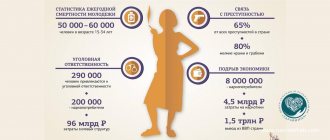On January 27, the State Duma adopted in the third reading a bill amending Article 116 of the Criminal Code, which is called “Beatings.”
Now assault in the family will be considered an administrative rather than a criminal offense. 380 deputies voted for the law. Politicians, experts and the public continue to debate the possible consequences of this act. Reference Before the adoption of the so-called “Law on Spanking” or the decriminalization of beatings (July 3, 2021), Article 116 of the Criminal Code “Beatings” applied to all offenses of this kind.
The new law introduced administrative liability for beatings committed for the first time and without aggravating circumstances. Criminal liability was reserved for those violators who acted out of hooligan motives, as well as because of political, religious or national hatred. In addition, the wording “in relation to close persons”, which was not previously there, was specially added to the text of Article 116 of the Criminal Code, with a decoding of this concept. At the same time, the Criminal Code was supplemented with Article 116.1, which introduces criminal penalties for those guilty of repeated beatings. The bill, adopted by the State Duma on January 27, removes the wording “in relation to close persons” from the text of Article 116 of the Criminal Code. Thus, domestic battery is treated the same as all other battery without aggravating circumstances. Let's start with the fact that the bill is not talking about “spanking” or beating half to death; this is a blatant exaggeration of possible situations. We are talking specifically about beatings.
What is considered "beating"
There are special criteria intended for forensic medical examination, which determine the various degrees of harm caused to human health. The law distinguishes between severe, moderate and mild harm. The article of the Criminal Code under which the perpetrator will be judged depends on what kind of damage the victim received.
“ Minor harm ” is a temporary impairment of body functions that leads to disability lasting up to three weeks, or to “permanent disability” of less than 10%.
In other words, if as a result of the beating the victim ended up on sick leave, but had to undergo treatment for less than three weeks, it means that her health was harmed to a “mild degree.” For this, the offender may receive punishment under Article 115 of the Criminal Code: a fine of up to 40 thousand rubles, or compulsory labor for up to 480 hours, or correctional labor for up to 1 year, or arrest for up to 4 months.
If the harm was caused from hooligan motives or for religious, political, racial, etc. reasons. hatred, the offender faces up to 2 years in prison.
The severity of harm caused to health is determined by forensic experts in a state medical institution, and the degree of disability is determined by a medical and social examination.
Since minor harm to health can also be caused unintentionally (for example, if passers-by accidentally collide on the street, during an accident, when throwing things from a balcony, etc.), the presence of intent is established during the investigation. To do this, they analyze the nature and method of causing harm to health, the psychophysical characteristics of the perpetrator and the victim, the motives for the crime, etc.
Beatings , which are referred to in Article 116 of the Criminal Code, are intentional actions that cause physical pain, but do not damage a person’s health. “Superficial injuries, including: abrasion, bruise, soft tissue contusion, including bruising and hematoma, superficial wound and other injuries that do not entail short-term health problems or minor permanent loss of general ability to work, are regarded as injuries that do not cause harm to human health ", says the medical criteria.
To confirm the fact of beatings, a medical examination is carried out.
A slap in the face, a slap in the face or a slap that leaves no traces is not considered beating. It is very difficult to prove that the victim experienced physical pain and that the perpetrator intentionally inflicted this pain.
So a parent who gave his disobedient child a slap on the head would hardly be sent to jail. But a wife, whom her husband, say, pulled by the hair, will need eyewitness testimony to bring her husband to justice, noted lawyer Maria Yarmush .
The perpetrator of beatings is brought to administrative responsibility under Article 6.1.1. “Beatings” of the Code of Administrative Offenses (CAO). He faces a fine of up to 30 thousand rubles, or arrest for 10-15 days, or compulsory work for up to 120 hours.
Previously, all beatings were considered a criminal offense, but on July 3, 2016, a law was passed to partially decriminalize them (the media called it the “spanking law”). Now, Article 116 of the Criminal Code applies only to those cases where the offender beat the victim for hooligan reasons or because of religious, political, national, etc. hatred. The culprit faces up to 2 years in prison.
Why the "spanking law"? Because until this document was repealed, beatings “in relation to close persons” also fell under Article 116. At the same time, “relatives” meant spouses, children, adoptive parents, adopted children, siblings, guardians, as well as persons running a common household with the victim.
An interesting conflict arose.
Having beaten his wife until she was bruised, the husband could end up in prison for up to two years. And having hit her harder, so that she ended up in the hospital with “minor harm to health,” he could have gotten away with just one year of correctional labor. Help : Compulsory work - performing free community service in your free time from your main job or study. Correctional work is carried out at the main place of work or in places determined by local government bodies in agreement with penal inspections, but in the area of residence of the convicted person. Deductions are made from the prisoner's salary in favor of the state ranging from 5% to 20%. Arrest means strict isolation from society. Deprivation of liberty is isolation from society by being sent to a colony, prison or medical correctional institution.
How parents asked the president to reserve the right to beat them
On the last day of June 2021, a picket of the Association of Parents' Committees was held in Moscow to protest against amendments to the Criminal Code prohibiting corporal punishment of children. The amendments introduced by Pavel Krasheninnikov and approved by the Federation Council on June 29 were called by their opponents “the law on the ban on education.” The Association of Parental Committees and Communities, in an open appeal to Vladimir Putin, emphasized the discriminatory nature of the changes towards parents, asked to take into account the traditional spiritual and moral values of the country and not to introduce a juvenile justice system in Russia. Read more
What happens if beatings are repeated in the family?
Supporters of the bill to decriminalize domestic battery constantly emphasize that it deals only with the first case of such an offense. For persons who have already been brought to administrative responsibility for beatings, there is Article 116.1 of the Criminal Code. It provides for a more severe punishment than the Administrative Code: a fine of up to 40 thousand rubles, or compulsory labor for up to 240 hours, or correctional labor for up to 6 months, or arrest for up to 3 months.
But in order to convict a domestic tyrant under this criminal article, you must first bring him to administrative responsibility.
Systematic beatings already fall under Article 117 of the Criminal Code “Torture” (if it does not entail grave or moderate harm to health). This is punishable, in particular, by imprisonment for up to 3 years. If the victim is a pregnant woman or child, then imprisonment can last up to 7 years.
Why Russians approve of decriminalizing beatings of loved ones
Deputy Speaker of the State Duma Andrei Isaev emphasized that the Criminal Code retains punishment for violence against a person, and violence against a pregnant woman and a minor will continue to be considered an aggravating circumstance. “We are talking about spankings and slaps, but no one is proposing to hang a medal on the chest for the same; serious administrative responsibility is provided for,” he said. He explained that the Criminal Code is being brought into line with the Constitution. “It turned out that if a mother found drugs in her son’s bedside table and slapped him for it, then she could become a criminal, but if someone else’s uncle gave him a black eye on the street, then no,” explained Mr. Isaev. “This is unfair. The parent community was concerned; the family did not need such attention from the state.” According to him, in Western Europe, as a result of such legislation, “children have been turned into Pavlikov Morozovs who snitch on their parents.” “We will not follow this path,” noted Andrei Isaev. “As for the bill adopted in the summer of 2021, we made a mistake then and are now correcting it.”
Ivan Buranov
It will be more difficult to prove guilt, but it will be easier to take children away
Since then, a circumstance has emerged that is not immediately apparent, which can seriously prevent victims of domestic violence from defending themselves.
It turns out that cases under Article 116 of the Criminal Code, from which beatings against loved ones were excluded, relate to criminal cases of private-public prosecution. And cases under Article 116.1 (on repeated assault), under which family members can still be prosecuted, are criminal cases of private prosecution.
What does it mean? In the case of private-public prosecution, a public prosecutor participates in the process. And in the case of a private prosecution, the victim of the crime must independently act as a prosecutor. As Maria Yarmush , an ordinary woman who is beaten by her husband will find it difficult to cope with this task due to ignorance of the intricacies of criminal proceedings, and she will have to hire a lawyer.
Participation in the case of the prosecutor is possible only by decision of the magistrate, if it is established that the victim, for objective reasons, cannot protect his legitimate interests (Article 318 of the Code of Criminal Procedure). For example, if the victim of beating is a child or an adult who is in a dependent or helpless state.
To initiate a criminal case, both in private and private-public accusations, a statement from the injured party is required. It is clear that the child cannot do this on his own. In this case, the application is written by his legal representative. What if it was the “legal representative” who beat the victim?
“If there are grounds to believe that the legal representative is not acting in the interests of the minor victim,” the decision of the plenum of the Supreme Court states, then the court may appoint another legal representative.
As a last resort, if the victim is a child or a “helpless” adult, the case is initiated by an investigator or interrogating officer with the consent of the prosecutor. In this case, any government agency, public organization or individual citizen can raise the question of initiating a criminal case with the prosecutor.
However, according to the leader of the “Stop Violence” movement Alena Popova , the norm that the prosecutor’s office and police should stand up for helpless citizens does not work in the regions.
“In the regions, elderly people are often victims. They beat them to take away their pension and apartment,” she noted.
At the same time, with a private prosecution, the family has more opportunities for reconciliation. The case may be dismissed at any time before the court retires to the deliberation room before sentencing. And in the case of a private-public accusation, the case cannot be terminated due to the reconciliation of the parties.
As for administrative proceedings, which now include beatings in the family that occurred for the first time, there is practically no investigation procedure, said Irina Kirkora , director of the author’s, member of the Human Rights Council. “The victim needs to collect evidence himself, which will be considered by the magistrate court,” she added.
On the other hand, the simplicity of administrative proceedings can make it easier to remove children from families, critics of the bill say. After all, a criminal battery charge involves investigation, collection of evidence, and compliance with various legal procedures. And within the framework of the Code of Administrative Offenses, it will be much easier to draw up a report on the infliction of “beatings” on a punished child, and this will become evidence of “cruel treatment,” they point out.
What do they have?
When considering the issue of improving Russian legislation in the field of domestic violence, we turned to the experience of foreign countries. In the United States, many states classify battery as an administrative offense. In such cases, the legislator believes that the act does not pose the social danger that would cause significant harm in order for it to be recognized as a crime. In most European countries, battery falls within the scope of civil law, as, for example, in the UK, Germany, and France.
For the commission of offenses in this area, including beatings, a measure of liability is provided in the form of an injunction, which can be expressed in the form of eviction, a ban on meetings, etc. In turn, there is criminal liability for violating the injunction. At the same time, at least 40 countries around the world have some kind of laws against domestic violence.
Some authors come to the conclusion that it is advisable to introduce the following changes to Russian legislation in the field of combating domestic violence.
1) Adopt a special federal law “On the Prevention of Domestic Violence,” aimed at protecting and rehabilitating not only victims of domestic violence, but also domestic troublemakers, as well as preventing domestic violence. This legal act should form a separate mechanism for combating domestic violence, regulate relations related to the creation of a system for the prevention of violence in the domestic sphere, the provision of services to victims of such violence, and also establish a special procedure for considering allegations of domestic violence. household sphere.
2) Add to Art. 63 of the Criminal Code of the Russian Federation as a type of aggravating circumstance, the commission of violence (physical, psychological, sexual, economic) against family members (wife, cohabitant; spouse, cohabitant; parents; children and other dependent family members).
3) It may also be advisable to introduce separate paragraphs in Part 2 of Art. 105, part 2. art. 111, part 2. art. 112, part 2, art. 113, part 2. art. 114, part 2. art. 115, part 2. art. 117, part 2. art. 131, part 2. art. 132 of the Criminal Code of the Russian Federation wording: “the same act committed against family members of the wife, cohabitant; spouse, cohabitant; parents; children and other dependent family members).” And based on the specified sign, enter the relevant parts into Art. 116, 119, 133, 134,135 of the Criminal Code of the Russian Federation.
The opinion of Russians according to VTsIOM
The majority of Russian citizens naturally condemn any type of domestic violence (79%). However, almost every fifth person (19%) allows the use of force against loved ones under certain circumstances, reports VTsIOM.
The decriminalization of beatings in the family is supported by 59% of the country's residents. At the same time, 33% of survey participants admitted that family violence had affected their friends, and 10% had personally experienced it in their family.
25% of respondents consider corrective labor to be an appropriate punishment for beatings in the family, 16% consider arrest, 13% consider a fine, 10% consider imprisonment, and 6% consider suspended imprisonment.









